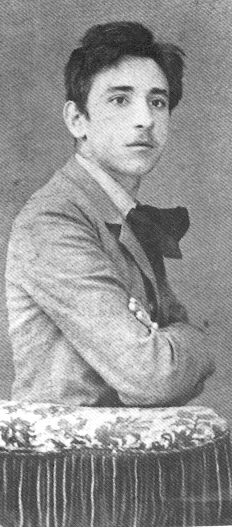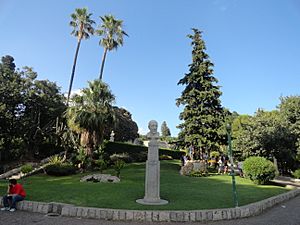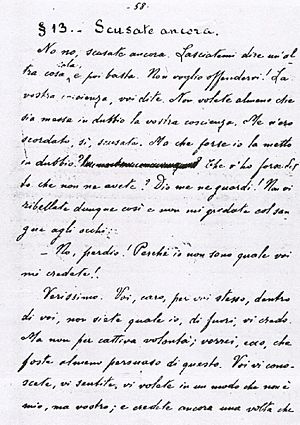Luigi Pirandello facts for kids
Quick facts for kids
Luigi Pirandello
|
|
|---|---|
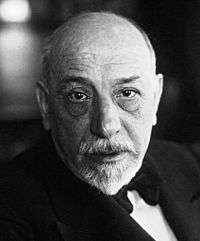
Luigi Pirandello in 1932
|
|
| Born | 28 June 1867 Girgenti (now Agrigento), Sicily, Italy |
| Died | 10 December 1936 (aged 69) Rome, Italy |
| Occupation | Writer |
| Nationality | Italian |
| Alma mater | University of Bonn |
| Genre | Drama, novel, poetry |
| Subject | Insanity, humour |
| Literary movement | Italian modernism |
| Years active | 1893–1933 |
| Notable works |
|
| Notable awards | Nobel Prize in Literature 1934 |
| Spouse |
Maria Antonietta Portulano
(m. 1894) |
| Children | Stefano (1895–1972) Rosalia (1897–1971) Fausto (1899–1975) |
| Signature | |
Luigi Pirandello (born June 28, 1867 – died December 10, 1936) was a famous Italian writer. He wrote plays, novels, poems, and short stories. His plays are considered his most important works. In 1934, he won the Nobel Prize in Literature. He received the award for his amazing ability to show deep human feelings and thoughts in his plays. Pirandello's works include many short stories, novels, and about 40 plays. Some of his plays are even written in the Sicilian language. His plays, which often mix sad and funny parts, are seen as early examples of the Theatre of the Absurd. This type of theatre explores how life can sometimes seem meaningless or confusing.
Contents
About Luigi Pirandello
Early Life and Family
Luigi Pirandello was born into a wealthy family in Sicily, Italy. His birthplace was a place called "Caos," near Porto Empedocle. His father, Stefano, came from a rich family who worked in the sulphur industry. His mother, Caterina Ricci Gramitto, also came from a well-off family.
Both of Luigi's parents strongly supported the idea of Italy becoming one country. His father even fought alongside Garibaldi to unite Italy. However, after Italy was united, many people, including Luigi's mother, felt disappointed. They felt that the new reality didn't live up to their ideals. This feeling of disappointment influenced Luigi's writing, especially his ideas about humour and the difference between dreams and reality.
Luigi was taught at home when he was young. He loved listening to his servant's fables and legends more than school lessons. By age twelve, he had already written his first play. Even though his father wanted him to study technical subjects, Luigi chose to study humanities, which he loved.
Moving to Palermo and Early Writings
In 1880, Luigi's family moved to Palermo, the capital of Sicily. There, he finished high school and read many books, especially poems by Italian writers. He started writing his own poems and fell in love with his cousin, Lina.
Around this time, Luigi and his father began to have disagreements. Luigi found out about his father's secrets, which made him trust his father less. Because of this, he grew even closer to his mother, whom he deeply admired.
In 1886, Luigi's cousin's family wanted him to marry Lina right away. They asked him to stop his studies and work in the sulphur business. Luigi worked with his father in the sulphur mines for a while. This experience later inspired some of his stories and parts of his novel The Old and the Young. However, the marriage to Lina was put on hold.
Pirandello then started studying at the University of Palermo. He was interested in both law and literature. He became friends with people involved in a big social movement in Sicily called the Fasci Siciliani.
Studies in Rome and Germany
In 1887, Luigi decided to focus on literature and moved to Rome to continue his studies. But Rome was not what he expected. He felt disappointed by the city, which was supposed to be a symbol of Italy's unification. This feeling of disappointment inspired some of his early poems.
While in Rome, he often went to the theatre. He felt a strong desire to become a playwright. "Oh the dramatic theatre! I will conquer it," he wrote.
Because of a problem with a professor, he had to leave the University of Rome. He then moved to Bonn, Germany, where he studied for two years. He read many German romantic writers and started translating poems. In 1891, he earned his doctorate degree.
Marriage and Early Career
After a short visit to Sicily, where his planned marriage to his cousin was called off, he returned to Rome. There, he met other writers who encouraged him to write stories. In 1893, he wrote his first important novel, Marta Ajala, which was published later. In 1894, he published his first collection of short stories.
Also in 1894, he married Maria Antonietta Portulano. His father had suggested her. She was a quiet girl from a good family. The first years of their marriage were happy, and Pirandello focused on his studies and writing. He had two sons, Stefano and Fausto, and a daughter, Rosalia.
Pirandello also started teaching Italian at a school in Rome in 1897. He continued to write many stories and plays. The late 1800s and early 1900s were very productive years for him. He published famous short stories and his second novel, Il Turno.
Family Challenges and Success
The year 1903 was a very difficult one for Pirandello. His father had invested a lot of money, including Antonietta's dowry, in sulphur mines that flooded. This caused the family to lose almost all their money. When Antonietta read the letter about the disaster, she suffered a severe mental shock. Her mental health was badly affected.
Pirandello tried his best to help his family. He taught more lessons in Italian and German. While dealing with this difficult situation, he wrote his novel Il Fu Mattia Pascal (The Late Mattia Pascal). This novel included parts of his own life, but changed into a story. It became very popular and was translated into German in 1905. This success helped him publish more books.
In 1908, he published an important essay called L'Umorismo (On Humor). In this essay, he shared his ideas about humor, which he saw as a mix of laughter and sadness.
Pirandello's fame as a writer grew, but his private life became harder. His wife, Antonietta, suffered from extreme jealousy and sometimes became violent. In 1919, Pirandello had to have his wife placed in a special care facility. This was very painful for him, and she remained there for the rest of her life.
World War I and Famous Plays
When Italy joined World War I, Pirandello's son, Stefano, joined the army and was captured. During this time, Pirandello continued to write plays. In 1916, his comedy Pensaci, Giacomino! was very successful.
In 1917 and 1918, many of his important plays were performed, including Così è (se vi pare) (Right you are (if you think so)) and Il Piacere dell'onestà (The Pleasure Of Honesty). His son Stefano returned home after the war ended.
In 1921, his most famous play, Sei personaggi in cerca d'autore (Six Characters in Search of an Author), was first performed in Rome. At first, it was not well received, with some people even shouting "Asylum!" However, the same play was a huge success when performed in Milan. In 1922, another of his famous plays, Enrico IV (Henry IV), was performed for the first time and was greatly praised. Pirandello's plays became known around the world.
Later Life and Legacy
Pirandello was an Italian nationalist and supported the Fascist government in Italy. In 1924, he joined the National Fascist Party. He once said he was "a Fascist because I am Italian." However, he often disagreed with Fascist leaders. In 1927, he even tore up his Fascist party card in front of an official. For the rest of his life, he was watched by the secret police.
His play, The Giants of the Mountain, is sometimes seen as a sign that he realized the Fascists were not good for culture. Despite his conflicts, he publicly supported Italy's actions in Abyssinia and even donated his Nobel Prize medal to the Fascist government in 1935 to help fund the war.
Between 1925 and 1926, Pirandello's last and possibly greatest novel, Uno, Nessuno e Centomila (One, No One and One Hundred Thousand), was published.
In 1929, Pirandello was made an Academic of Italy. In 1934, he won the Nobel Prize for Literature. He was the last Italian playwright to win this award until Dario Fo in 1997.
Luigi Pirandello died alone in his home in Rome on December 10, 1936. He did not want a big state funeral. His ashes were buried in Sicily in 1947. A street in Acquaviva delle Fonti is named after him.
Selected Works
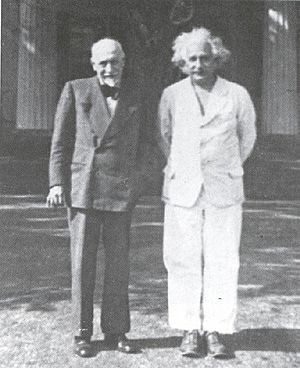
Major Plays
- 1916: Liolà
- 1917: Così è (se vi pare) (So It Is (If You Think So))
- 1917: Il piacere dell'onestà (The Pleasure of Honesty)
- 1921: Sei personaggi in cerca d'autore (Six Characters in Search of an Author)
- 1922: Enrico IV (Henry IV)
- 1923: L'uomo dal fiore in bocca (The Man with the Flower in His Mouth)
- 1924: Ciascuno a suo modo (Each in His Own Way)
Novels
- 1904: Il fu Mattia Pascal (The Late Mattia Pascal)
- 1913: I vecchi e i giovani (The Old and the Young)
- 1926: Uno, nessuno e centomila (One, No One and One Hundred Thousand)
Short Stories
- 1922–37: Novelle per un anno (Short Stories for a Year), a collection of 15 volumes.
Poetry
- 1889: Mal giocondo (Playful Evil)
- 1901: Zampogna (The Bagpipe)
Film Adaptations
Many of Pirandello's works have been turned into movies. Here are some examples:
- Feu Mathias Pascal, a French film from 1925, based on his novel Il fu Mattia Pascal.
- As You Desire Me, an American film from 1932, based on his play Come tu mi vuoi.
- Henry IV, an Italian film from 1984, based on his play Enrico IV.
- Kaos, an Italian film from 1984, based on four of his short stories.
- The Wait, an Italian film from 2015, based on his play La vita che ti diedi.
See also
 In Spanish: Luigi Pirandello para niños
In Spanish: Luigi Pirandello para niños


